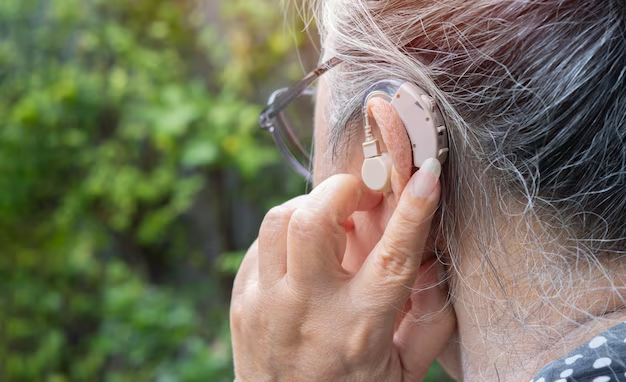Your Guide to Are Hearing Aids Covered By Medicare
What You Get:
Free Guide
Free, helpful information about Medicare Insurance and related Are Hearing Aids Covered By Medicare topics.
Helpful Information
Get clear and easy-to-understand details about Are Hearing Aids Covered By Medicare topics and resources.
Personalized Offers
Answer a few optional questions to receive offers or information related to Medicare Insurance. The survey is optional and not required to access your free guide.
Is Medicare Paying for Your Hearing Aids? Here's What You Should Know
For many, hearing aids are not just a tool to improve quality of life but an absolute necessity for communication and safety. Given their importance, a common question arises: Are hearing aids covered by Medicare? Navigating the intricacies of healthcare coverage can be daunting, but understanding the policies surrounding hearing aid coverage can help manage both expectations and finances.
Understanding Medicare Coverage
Medicare, the federal health insurance program primarily for people aged 65 and older, does not traditionally cover hearing aids. Medicare Part A (Hospital Insurance) and Part B (Medical Insurance) typically exclude routine hearing exams, hearing aids, and exams fitting hearing aids. However, Medicare will cover diagnostic hearing and balance exams if your doctor deems them necessary to evaluate a medical problem.
Exploring Medicare Advantage Plans
Fortunately, there are Medicare Advantage Plans, also known as Part C, which are offered by private companies approved by Medicare. Some of these plans provide additional benefits that Original Medicare doesn’t cover, such as vision, dental, and hearing services. While some Advantage Plans may include hearing aid coverage, the extent varies significantly between different providers and plans. It's essential to compare plans and speak with a representative to verify what is covered.
Other Financial Assistance Options
If Medicare doesn't meet your hearing needs, there are various avenues to explore for financial assistance:
- Veterans Benefits: Hearing aids are often fully covered for eligible veterans through the Department of Veterans Affairs (VA).
- State Programs: Many states have programs offering financial assistance for hearing aids. Eligibility and application requirements differ, so checking with your state’s department of health or human services can provide guidance.
- Nonprofit Organizations: Numerous charities and nonprofits provide assistance, such as the Hearing Aid Project, which connects individuals to free or low-cost hearing aids.
Grants and Educational Resources
In some cases, educational grants or resources might be applicable for those who qualify:
- Rehabilitation Programs: Some programs aimed at hearing impairment rehabilitation may offer financial support for devices like hearing aids.
- Community Health Services: Local community health centers might offer sliding scale fees based on income, helping reduce the cost of hearing aids.
Planning and Managing Costs
Budgeting is crucial when planning for hearing aids:
- Flexible Spending Accounts (FSA) or Health Savings Accounts (HSA): These accounts allow you to set aside pre-tax money to pay for medical expenses, including hearing aids.
- Payment Plans: Some audiologists and hearing aid providers offer payment plans to spread the cost over time.
- Discount Programs: Certain organizations and retailers offer discounts to members, making hearing aids more affordable.
While the lack of direct coverage through standard Medicare can be disappointing, these alternatives and financial strategies can provide a pathway to hearing aid affordability. Knowing that options exist can be both reassuring and empowering.
Financial Assistance and Educational Opportunities 🌟
- 🏥 Medicare Advantage Plans: Offer additional coverage options including hearing aids.
- 🎖️ Veterans Benefits: Potential full coverage for eligible veterans.
- 📞 State Programs: Check individual states for variations in benefits.
- 🤝 Nonprofit Organizations: Seek assistance from charities like the Hearing Aid Project.
- 🏫 Rehabilitation and Community Programs: Offer support and financial help for auditory rehabilitation.
- 💳 FSA/HSA: Pre-tax accounts to manage medical costs.
- 📊 Payment Plans and Discounts: Flexible and discounted purchase options available.
Navigating hearing aid procurement through Medicare may seem complex, but understanding the landscape of available resources can lead to a financially viable solution. These tools and services are not just aids to those in need but a testament to the ongoing effort to improve accessibility to essential health care services.
What You Get:
Free Medicare Insurance Guide
Free, helpful information about Are Hearing Aids Covered By Medicare and related resources.

Helpful Information
Get clear, easy-to-understand details about Are Hearing Aids Covered By Medicare topics.

Optional Personalized Offers
Answer a few optional questions to see offers or information related to Medicare Insurance. Participation is not required to get your free guide.


Discover More
- Am I Elgible For Medicare
- Am I Enrolled In Medicare
- Am I Qualified For Medicare
- Are Adult Diapers Covered By Medicare
- Are Chemotherapy Drugs Covered By Medicare Part d
- Are Colonoscopies Covered By Medicare
- Are Covid Tests Covered By Medicare
- Are Cpap Machines Covered By Medicare
- Are Cpap Supplies Covered By Medicare
- Are Dental Implants Covered By Medicare
